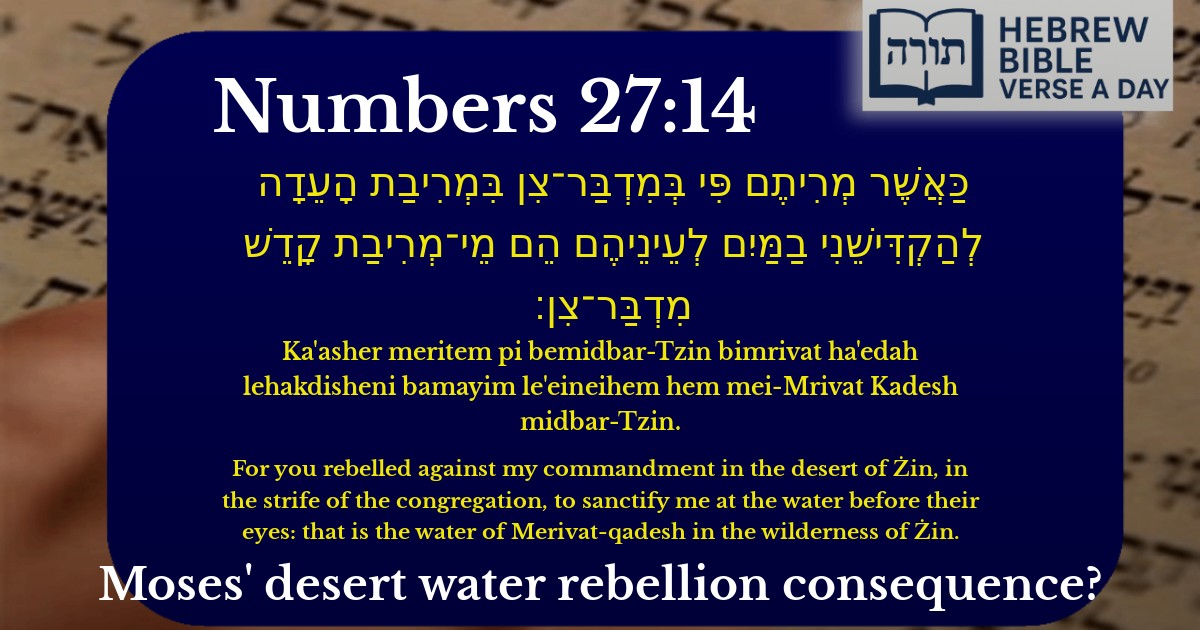Join Our Newsletter To Be Informed When New Videos Are Posted
Join the thousands of fellow Studends who rely on our videos to learn how to read the bible in Hebrew for free!
Hebrew Text
כַּאֲשֶׁר מְרִיתֶם פִּי בְּמִדְבַּר־צִן בִּמְרִיבַת הָעֵדָה לְהַקְדִּישֵׁנִי בַמַּיִם לְעֵינֵיהֶם הֵם מֵי־מְרִיבַת קָדֵשׁ מִדְבַּר־צִן׃
English Translation
For you rebelled against my commandment in the desert of Żin, in the strife of the congregation, to sanctify me at the water before their eyes: that is the water of Merivat-qadesh in the wilderness of Żin.
Transliteration
Ka'asher meritem pi bemidbar-Tzin bimrivat ha'edah lehakdisheni bamayim le'eineihem hem mei-Mrivat Kadesh midbar-Tzin.
Hebrew Leining Text
כַּאֲשֶׁר֩ מְרִיתֶ֨ם פִּ֜י בְּמִדְבַּר־צִ֗ן בִּמְרִיבַת֙ הָֽעֵדָ֔ה לְהַקְדִּישֵׁ֥נִי בַמַּ֖יִם לְעֵינֵיהֶ֑ם הֵ֛ם מֵֽי־מְרִיבַ֥ת קָדֵ֖שׁ מִדְבַּר־צִֽן׃ {ס}
Parasha Commentary
📚 Talmud Citations
This verse is quoted in the Talmud.
The verse is referenced in the context of discussing the events at Meribah and the consequences of the Israelites' rebellion.
📖 Sanhedrin 8a
The verse is cited in a discussion about the importance of following divine commandments and the repercussions of disobedience.


Context of the Verse
The verse refers to the incident at Mei Merivah (the Waters of Strife) in the wilderness of Tzin, where Moshe and Aharon were commanded to speak to the rock to bring forth water for Bnei Yisrael (Bamidbar 20:1-13). Instead, Moshe struck the rock, leading to severe consequences for both him and Aharon.
Rashi's Explanation
Rashi (Bamidbar 20:12) explains that the sin of Moshe and Aharon was not following Hashem's command precisely—they struck the rock instead of speaking to it. This diminished the sanctification of Hashem's name (Kiddush Hashem) because the miracle would have been greater had they spoken to the rock, demonstrating that even an inanimate object obeys Hashem's word.
Rambam's Perspective
In Moreh Nevuchim (1:54), Rambam suggests that Moshe's anger at the people ("Listen now, you rebels!"—Bamidbar 20:10) was a lapse in leadership. A leader must remain composed, especially when performing miracles, to ensure the people recognize Hashem's greatness rather than the leader's emotions.
Midrashic Insights
Significance of the Sin
The Kli Yakar (Bamidbar 20:12) explains that Moshe's striking the rock instead of speaking to it gave the impression that Hashem required an action to bring forth water, rather than His word alone. This diminished the lesson of emunah (faith) that could have been taught—that Hashem's will alone governs nature.
Consequences and Lessons
As a result of this incident, Moshe and Aharon were barred from entering Eretz Yisrael (Bamidbar 20:12). The severity of the punishment underscores the gravity of failing to sanctify Hashem's name properly, especially for leaders who serve as role models for Klal Yisrael.